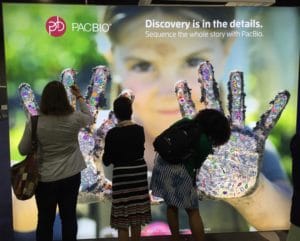
When it comes to bacteria, resistance is not always futile, or so we learned at the annual meeting of the American Society for Microbiology. One of our favorite events of the year, ASM Microbe was full of fun puns, giant pathogen dolls, and amazing science spanning basic molecular biology and physiology, antimicrobial agents and resistance, environment, ecology and evolution, and clinical and public health microbiology.
We invited attendees to get hands on at our booth — quite literally — and our giant interactive hands art piece was a big hit. Four of our Certified Service Providers — The University of Maryland Institute for Genome Sciences, GENEWIZ, Macrogen, and RTL Genomics — were also on hand to answer questions about our technology, which was further highlighted in a presentation by Principal Scientist Cheryl Heiner on “Single Chromosomal Genome Assemblies on the Sequel System with Circulomics High Molecular Weight DNA Extraction for Microbes,
Microbial multiplexing was a hot topic, and we were excited to share information about new tools we recently released to make it easier and less expensive to sequence microbial genomes on the Sequel System. The streamlined workflow — from library preparation to genome assembly — includes the release of two new 8-plex barcoded adapter kits specifically validated for multiplexing microbial genomes, a multiplexing calculator to ensure even coverage when pooling barcoded samples, streamlined de-multiplexing with SMRT Link v5.1.0, and optimized setting for microbial genome assembly with HGAP4.
Advances enabled by PacBio long-read sequencing technology were also showcased in more than 25 posters and presentations. Several posters focused on bioinformatics methods. Lee Katz’s cleverly titled “Kraken with Kalamari: Contamination Detection” poster attracted a lot of interest. Katz, a scientist with the CDC, described how leveraging a curated database of closed PacBio genomes with Kalamari enables better identification of bacteria when using the popular Kraken metagenomics tool for foodborne disease surveillance. Seok-Hwan Yoon of the Chun Lab presented another bioinformatics focused poster about the EzBioCloud project, a valuable taxonomy resource that has incorporated a staggering amount of PacBio data.
Other posters delved into understanding the evolution of human pathogens. CDC scientist Michael Weigand shared his findings about whooping cough resurgence in the United States in his talk, “Chromosome Rearrangement, Gene Amplification, and Insertion Sequence Elements in the Genome Evolution of Bordetella pertussis and the Genus Bordetella.” If you have an ASM Microbe login, check out a poster presentation of his work. Bordetella (of the birdie variety) was also the topic of an award-winning abstract, “Clonal Evolution and Genomic Diversification of Bordetella Hinzii in An Immunocompromised Host,” by Adrien Launay of the NIH during a rapid-fire presentation, “Microbe, Know Thy Host.” Three students from the University of New Hampshire working in the lab of Cheryl Whistler presented work on the biology and ecology of Vibrio. Sarah Eggert and Jillian Means investigated the the pathogenesis of vibrio parahaemolyticus, the leading cause of seafood-borne bacterial infections, and the spread of this pathogen into the Gulf of Maine. Jennifer Calawa won an Outstanding Abstract Award for her work on the comparative genomics of two closely related Vibrio fischeri strains with varying symbiotic capabilities. Attendees also learned more about the amazing new resource released by the UK’s National Collection of Type Cultures (NCTC), in partnership with the Wellcome Sanger Institute and PacBio: reference genome assemblies of 3,000 strains of important historic and modern bacteria, including some of the deadliest.
Of course, research interests at ASM microbe extend well beyond infectious disease. Anne Hatmaker of Tennessee’s Oak Ridge National Lab explored the potential of Megasphaera elsdenii — a bacterium found in the rumen of cattle — in the production of biofuels in her late-breaking abstract.
Finally, we used the meeting to launch what has also become an annual tradition: The Microbial Genomics SMRT Grant Program, made possible this year with the help of the University of Maryland’s Institute for Genome Sciences. You, too, can apply for the chance to win free SMRT Sequencing and bioinformatics analysis by submitting a 250-word proposal by July 20.